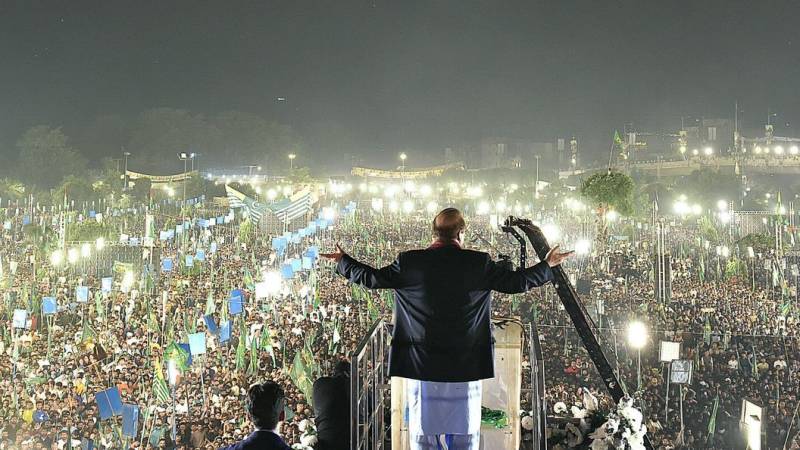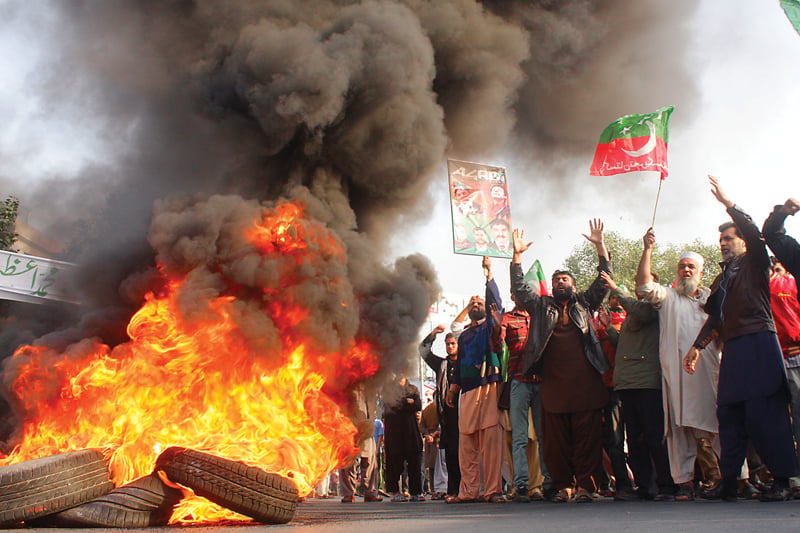On the evening of October 21st, the major arteries leading into Lahore were clogged with cars, buses and trucks carrying fervent supporters of former Prime Minister Nawaz Sharif. As night fell, Greater Iqbal Park, infamous for political gatherings, was teeming with people from across the country. Party anthems praising Sharif blared from speakers scattered throughout the park, while party leaders anxiously awaited the arrival of their supreme leader. Sharif soon appeared in a helicopter above the park, enthusiastically waving to his supporters who had come to hear him speak after six years.
The stage was set for Sharif’s grand return. For weeks, the Pakistan Muslim League inundated the airwaves with campaign ads, adorning Lahore with party flags and banners featuring Sharif’s image. Party ticket holders had been instructed to transport thousands of workers to welcome their leader. After a disastrous year in power, leading a coalition government, the party had to display its political influence in the heart of Punjab. This forced them to play their trump card: Nawaz Sharif. It was time for the party not only to assert their relevance but also to demonstrate their significance to the ultimate power player in the country, the Pakistan Army.
Despite being convicted and sentenced to prison in 2019, Nawaz Sharif had received special permission from then-Prime Minister Imran Khan to seek medical treatment in the United Kingdom. To travel abroad, Sharif signed a promissory note, pledging to return to Pakistan within four weeks. Those weeks turned into four years.
Over the last year, Pakistan has experienced a turbulent political climate. Imran Khan was ousted as prime minister while interim caretaker setups were formed as the national and provincial assemblies were dissolved. Khan was arrested earlier this year, triggering mass protests nationwide, leading to arson and attacks on military institutions in various cities. In an attempt to establish their authority, the military cracked down on Imran Khan’s political party, the Pakistan Tehreek-i-Insaf, arresting top leaders and supporters. Additionally, to weaken PTI, the military has been detaining politicians from Khan’s party, pressuring them to leave PTI and forcing them to join other parties.
While PTI currently faces military wrath, Khan had been the military’s favoured candidate for the past decade. In 2018, the military manipulated political scenarios and electoral results to make him prime minister. During his tenure, Khan enthusiastically engaged the military as his enforcer to help him govern. This included cracking down on political opponents and slapping them with frivolous charges in order to imprison them.
Today, a cloud of fear, anger, and resentment hangs in the air. In the absence of a functioning parliament, the military dominates the space reserved for elected representatives. Human rights are violated as antiquated colonial-era laws are exploited to silence any dissent. Women who exercised their democratic right to protest have been imprisoned for months. Languishing in jails with no respite in sight, many mothers have been distraught whose children are suffering due to their incarceration. One such prisoner has written an open letter, desperately seeking justice against her detainment. As part of the crack down, over 100 civilians were initially set to be tried in military courts. However, a recent Supreme Court ruling declared such trials unconstitutional. Social media posts favouring Imran Khan are being monitored, police officials are constantly ransacking homes of PTI supporters forcing many into silence.
As the military strategically attempts to diminish Khan’s party, they now openly support Nawaz Sharif’s return to power as a counter balance against Imran Khan. Upon landing in Islamabad, Sharif disembarked and sat in a VIP lounge as immigration personnel, state officials and lawyers exclusively processed his entry into Pakistan. Sharif then hopped back into his charter plane and took off for Lahore to address his supporters. While Sharif may currently be receiving preferential treatment at the behest of the army, he would be smart to avoid being used by the military in their battle against Imran Khan. The winds of favour change very quickly in Pakistan.
Despite being elected as Pakistan’s prime minister multiple times, Sharif has always clashed with the military. In 1999, while having a two-thirds majority in parliament, Sharif was removed from office in a coup d’état led by former military chief General Pervez Musharraf. After becoming prime minister in 2013, Sharif again fell out with the military when he sought to hold Musharraf accountable for his coup. Sharif was forced out of power when a military-friendly Supreme Court disqualified him on weak grounds.
In Pakistan’s 76-year history, rarely has there ever been an election without rigging influenced by state institutions. While Khan might have ascended to power with military support, he is a political force that cannot be ignored. It was destructive for the military to harass politicians when Khan was in power, and it is equally detrimental to engineer politics today. Conducting elections without PTI’s participation will only further weaken Pakistan’s fragile democracy, as they would lack legitimacy and credibility.
Nawaz Sharif has made his grand entrance. Now it is time for Imran Khan to be released from jail for free and fair elections. While the country is cognizant of the army’s electoral manipulation, the men in uniform must recognize that maneuvering politics is neither their expertise nor their constitutional responsibility. Unsurprisingly, they have failed miserably whenever attempting to manage civilian affairs. Pakistan has endured enough through coups, dictatorships, hybrid regimes, and constrained civilian governance. These experiments have consistently failed in the past and should have no place in the country’s future. The only thing act left to attempt is a fair election with the majority government allowed to complete its full tenure. A nation of 240 million people deserve elections and, more importantly, deserve to be heard.


